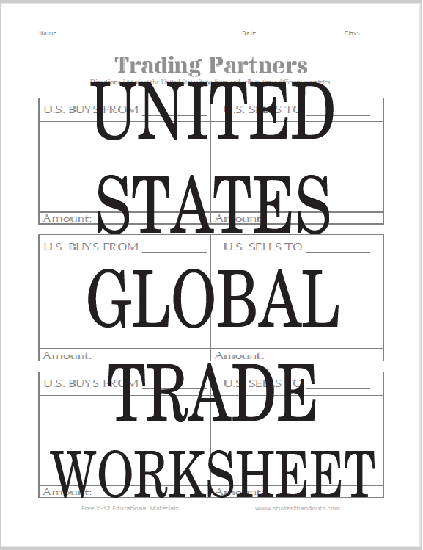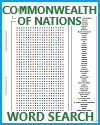| United States Trading Partners Chart Worksheet |
|---|
| www.studenthandouts.com ↣ Social Studies ↣ Economics ↣ Globalization |
 |
    |
|
Click here to print.
Directions: List what the United States buys from and sells to three different countries. Teachers may select which countries to research, or teachers may leave students free to choose. Students must complete the chart, listing not only what goods and services are sold to or purchased from these countries, but how much this trade amounts to annually in U.S. dollars. Understanding global trade is crucial for Social Studies students for several significant reasons. Economic Literacy: Global trade is a fundamental aspect of the global economy. To be economically literate, students must comprehend the basic principles, mechanisms, and impacts of international trade. Interconnected World: In today's interconnected world, no country operates in isolation. Global trade is the backbone of the international economy, and students need to grasp how it influences their nation's economic well-being. Cultural Exchange: Global trade facilitates cultural exchange. It introduces students to products, ideas, and traditions from around the world, contributing to cultural awareness and appreciation. Geopolitical Significance: Trade agreements, tariffs, and trade policies have significant geopolitical implications. Understanding global trade helps students comprehend international relations and diplomacy. Historical Context: Many historical events and developments are closely tied to global trade, including colonization, the Silk Road, and the Age of Exploration. Knowledge of global trade enhances historical understanding. Environmental Impact: Global trade has environmental consequences, such as carbon emissions from shipping and resource depletion. Students must consider the environmental impact of trade in discussions on sustainability. Employment Opportunities: A substantial portion of the workforce is employed in jobs related to global trade, including logistics, customs, and international marketing. Understanding global trade can broaden students' career prospects. Inequality and Development: Global trade can exacerbate economic inequality or contribute to the development of less industrialized nations. Students need to understand its role in these dynamics. Consumer Choices: As consumers, students make choices about the products they buy. Understanding global trade allows them to make informed choices about the origin, ethics, and environmental impact of products. Supply Chains: Many industries rely on global supply chains. Students should grasp how these supply chains operate and the vulnerabilities they can present, as demonstrated during global crises like the COVID-19 pandemic. Entrepreneurship: Global trade offers opportunities for entrepreneurship. Students may be inspired to explore international business ventures or work for multinational corporations. National Security: Economic security is closely linked to national security. Understanding global trade can help students appreciate the strategic importance of certain industries and resources. Crisis Preparedness: Knowledge of global trade is essential for crisis preparedness. In times of economic upheaval or international conflicts, students can better understand the potential impacts and responses. Global Citizenship: To be informed global citizens, students should understand the complexities and challenges of the global economy, including trade relations between their own country and others. Future Challenges: Global trade will continue to evolve, facing challenges such as automation, digitization, and changing geopolitical dynamics. Preparing students to navigate these challenges is essential for their future. Overall, understanding global trade is a critical component of a well-rounded Social Studies education. It equips students with the knowledge and skills needed to navigate the complex and interconnected world of international economics, trade policies, and global relations. |
| www.studenthandouts.com ↣ Social Studies ↣ Economics ↣ Globalization |














































